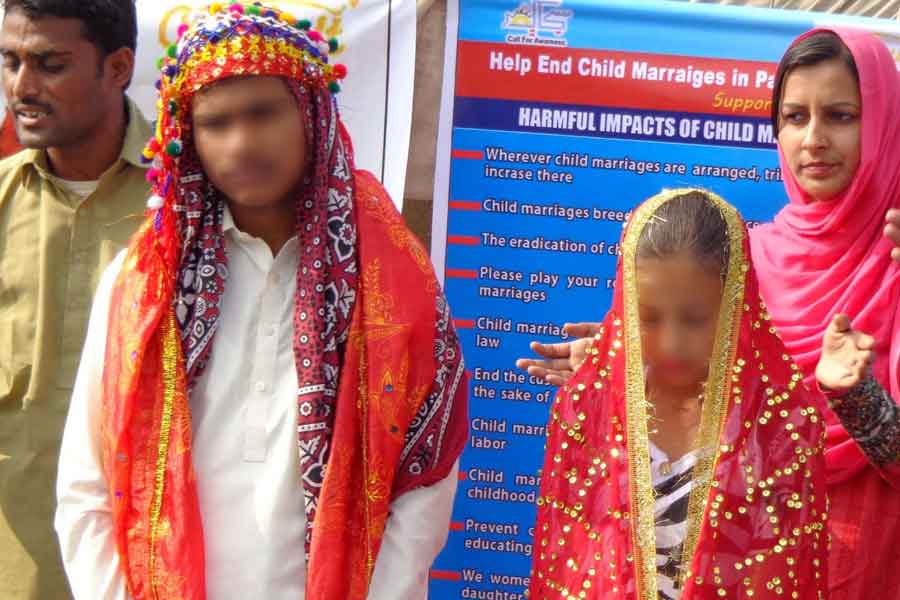- Shahar Baloch’s recent BBC report highlights the distressing situation in Balochistan post-2022 floods, where families in financial crisis are compelled to marry off their daughters to older men to cope with mounting debts and medical expenses.
- Chowki Jamali, a remote region on the Sindh-Balochistan border, saw over 3.2 million families displaced by floods in 2022, predominantly affecting farmers and daily wage laborers, who now face economic hardships, leaving them with no apparent alternatives.
- The practice of selling daughters, known as “climate brides,” is on the rise due to the intersecting challenges of poverty and climate change, particularly as agriculture becomes less profitable. This alarming trend, along with inadequate legal measures, places the burden of flood damage on vulnerable young girls in Balochistan.
Journalist and narrator, Shahar Baloch, recently filed a report for the BBC concerning the repercussions of the devastating floods that struck Balochistan the previous year.
The report discloses a distressing situation where families from low-income backgrounds, grappling with the aftermath of the floods, find themselves compelled to arrange marriages for their daughters as a result of mounting debts.
This dire circumstance came to light in the Chowki Jamali area, which was among the hardest-hit regions during the floods of 2022.
Chowki Jamali, a remote locality situated on the border of Sindh and Balochistan, is inhabited primarily by approximately 50,000 people, many of whom are farmers and daily wage labourers. The year 2022 witnessed over 3.2 million families displaced by floods, with the provinces of Sindh and Balochistan enduring the most severe consequences.
Also Read:
Man Weds 12-Year-Old Daughter for 50,000 PKR to Repair House Damaged by Flood
As these families struggled to recover, the economic downturn forced many of them to arrange marriages for their young daughters with older men, typically between 40 and 60, in exchange for financial relief to settle debts or cover medical expenses. Daily wage labourers, earning as little as 500 rupees per day, express feeling as though they have no alternative.
Local residents note that early marriages have occurred in this area in the past as well.
In August 2022, the Provincial Disaster Management Authority (PDMA) conducted a survey across 14 districts of Balochistan. According to the survey, there has been a 13% increase in reported instances of selling female children.
In most cases, girls are exchanged for sums ranging from three to five lakh rupees, providing a lifeline for financially strained families who often rely on these transactions to settle their debts, access medical care, or invest in their son’s education.
Compounding the issue, in some instances, girls are sold multiple times if they fail to adapt to their new circumstances. Some girls even flee upon learning of their imminent sale, leaving their younger sisters to be married off in their place.
Also Read:
Female Victims of Pakistan Floods are Suffering from UTIs & Reproductive Complications: WaterAid
The term “climate brides” has been coined to describe these girls, and this troubling practice is not unique to Balochistan; it also occurs in other regions such as Africa and India where poverty and climate change intersect.
Climate change and floods have rendered agriculture increasingly unprofitable in Balochistan, driving families to resort to desperate measures. Faced with meagre income and food scarcity, many residents of Chowki Jamali see no alternative but to arrange marriages for their daughters in order to survive.
Despite the positive impact of education, parents in these dire economic circumstances continue to take this drastic step.
Healthcare workers report severe health consequences for young girls married off at an early age, including pregnancy complications and the development of conditions like fistulas. Despite being aware of the issue, authorities have struggled to combat these early marriages effectively.
Lady health worker Shehzadi shared with the BBC that, in some instances, girls endure excruciating pain, and some even lose their lives. She added, “We can raise our voices, we can speak out, but the mothers in these households often have no say because it is the men who make the decisions regarding the marriages.”
Also Read:
Karachi University Students Design Movable Flood-Proof House
Madad Community, an organization focused on addressing climate change in Balochistan, recently highlighted the immense challenges posed by climate change and floods, which have made earning a livelihood in the agricultural sector exceedingly difficult.
Maryam Jamali, an organizer with the group, emphasized that many people have been compelled to migrate, including the middle-class population of Balochistan. Impoverished farmers, however, have nowhere else to turn. The region is bracing for more droughts and floods due to escalating temperatures.
Fauzia Shaheen, Chairperson of the Government Commission for Women, revealed that Balochistan lacks effective legislation to combat child marriages, and efforts to pass the Child Marriage Restraint Bill have encountered obstacles.
In Balochistan, it is painfully evident that the burden of flood-related damages is disproportionately borne by the region’s vulnerable young girls, who are forced into early marriages as a consequence of dire economic circumstances.
Share your thoughts with us in the comments below.
Stay tuned to WOW360.
